We managed to coerce @ZimmermanAnna to focus all 150 watts of her awesomeness on deconstructing the eleventh-hour filing by Lance Armstrong’s legal team that we managed to get our hands on late last night (because the high-paid interns at Patton Boggs LLP and Howry Breen & Herman LLP like to do everything at the last minute). Thank you, Anna for spending your over-caffeinated wee hours curled up with a good yarn…
* * * * *
But first, let’s poke fun. Can I just say that I think it’s really cute that the Lance Armstrong Legal Team sent an email to William Bock, the general counsel for the USADA, requesting permission to exceed the page limit? This is after filing an 80+ page complaint that so thoroughly failed to meet requirements that Judge Sparks dismissed it altogether and after missing a rather obvious filing deadline to respond, the Legal Team is now asking for permission to exceed the page limit, too? I mean c’mon guys, learn how to make your point and shut up; you might actually get your homework turned in on time if you knew when to stop typing.
Local Rule CV-7(e) limits the length of responses to dispositive motions to 20 pages and the Legal Team’s response, despite their best efforts, weighed in at 28 pages. The reason for the page limit is simple: everyone’s time is valuable – the plaintiff’s attorney who spent an eternity typing (and billing) for the mammoth document; the judge and his staff who have to read, fact-check, and research everything in the mammoth document; and the defendant’s attorney who has to read, fact-check, research, and respond to everything in the mammoth document (and bill for the time required to do so). There’s a generally accepted rule amongst attorneys that if you can’t make your case concisely, it’s because you don’t have one.
In the email exchange in which Mr. Bock flatly refuses to permit the extension on the grounds that it’s overly burdensome to him and his staff, the Lance Armstrong Legal Team cites the need to attach hundreds of pages of various anti-doping rules. Look, I’m going to be real blunt and say it: Mr. Armstrong’s Legal Team has the duty to weed through the muck and mire to locate the relevant rules, not the court and not the defendant.
According to the series of emails, which Mr. Bock insisted the Legal Team attach to the request for a page extension, Tim Herman, one of Mr. Armstrong’s attorneys said, “I do not think the court appreciates being burdened with self-serving emails sent between lawyers.” To which I say, but you think the court appreciates being burdened by hundreds of pages of complicated (and probably completely irrelevant) anti-doping codes? And you think the court appreciates being burdened with an 80-page complaint that fails to meet the basic requirements of the Federal Rules of Civil Procedure? And you think the court appreciates being burdened by your failure to timely file a response to a dispositive motion? And you think the court appreciates being burdened by yet another overly-long document that fails to meet the basic rules for submission and is accompanied by yet another last minute request to bend the rules? Exactly how many times do you expect to be allowed to breach the court’s procedural rules?
For a man who is so concerned about the rules being properly applied to him, Mr. Armstrong doesn’t seem to be at all concerned about following the rules properly himself. I don’t believe for a second that if the tables had been turned that the Lance Armstrong Legal Team would not have wholly objected to the original complaint, to the request for a brief extension for time to file a response after missing a deadline, and the request to extend the page limit for a response. Shoot, they’d probably already be pitching a fit in front of the United States Supreme Court if Judge Sparks had granted the USADA the same leniency he has granted the Legal Team.
I read all 36 pages of the Memorandum in response to the USADA’s motion to dismiss. In fairness, the substantive portion was 28 pages, though it was quite painful and burdened with almost excessive citation of irrelevant cases; funny how that happens when the document exceeds the page limit by 40%.
All of this mumbo-jumbo boils down to a couple of key points. One, through the magic of the legal loopholes, the UCI has exclusive jurisdiction over everything. Two, Mr. Armstrong never consented to arbitration with the USADA because the Ted Stevens Olympic and Amateur Sports Act [Sports Act] does not apply to professional cyclists (automatically declares that sports eligibility disputes be resolved by arbitration), and even though he consented to be governed by the USADA through his UCI license application, USADA shouldn’t have jurisdiction over him because they’re not following the rules.
Part One: Reasons why the UCI has exclusive jurisdiction to initiate an investigation, to determine if a doping violation likely occurred, to initiate formal charges, to delegate the proceedings to the USADA because 1) the samples at issue were collected by the UCI, 2) the allegation of anti-doping violations was “discovered” by UCI through a UCI license-holder (Floyd Landis) and the allegations were made to USAC and UCI, 3) Mr. Armstrong is retired and UCI had original jurisdiction during his employment, 4) UCI has asserted its jurisdiction and told USADA not to proceed, and 5) WADA gives UCI jurisdiction, in case you forgot. Oh and 6) conspiracies don’t exist in UCI ADR and WADA fairyland, so the charges are impossible, and 7) the Travis Tygart affidavit from the insurance-claim is irrelevant.
My first reaction was, so if the UCI has exclusive jurisdiction over “results management” at every stage, then what’s the point of the USADA? What about Floyd Landis? Was the USADA’s decision on his case null and void because UCI actually had jurisdiction? Mr. Landis tested positive for testosterone during the 2006 Tour de France (UCI sample), yet the USADA conducted the formal proceedings. The step not often discussed is that the UCI initiated the investigation based on the positive test results, made a determination that an anti-doping violation likely occurred, and then delegated the responsibility of conducting the formal proceeding to the USADA.
According to the Lance Armstrong Legal Team, the USADA only has authority to investigate and adjudicate alleged anti-doping violations after the UCI gives it permission to proceed. In fact, the “long leg” of the UCI extends so deep into the creation of exclusive jurisdiction for itself that it essentially turns the USADA into a powerless puppet used to create a false appearance of independence and neutrality to the public. If every single rider and team staff member is considered a UCI license-holder for the purposes of discovery, then one can hardly imagine a situation in which UCI couldn’t claim “discovery” of an anti-doping allegation, and with it, exclusive jurisdiction to investigate or ignore the allegation. Even if Mr. Landis had reported his anti-doping allegations against Mr. Armstrong exclusively to USADA, UCI would still have exclusive jurisdiction to decide whether an anti-doping violation had likely occurred and whether to permit USADA to proceed. When, if ever, does USADA actually have exclusive jurisdiction to pursue anti-doping allegations independent of Puppet Master UCI’s permission? With all of the power rolling up the ladder to UCI, one can certainly start to appreciate why there are so many rumors and accusations of corruption, manipulation, and general wrongdoing on behalf of UCI. This is, after all, an organization that refuses to recognize conspiracy as a form of anti-doping violation and readily accepts large monetary donations from athletes suspected of doping.
What’s substantially downplayed by the Lance Armstrong Legal Team is the reason why USADA is refusing to submit to UCI’s jurisdiction: USADA believes UCI’s conflicts of interest are so vast that they will be unable to make a neutral decision on the allegations against Mr. Armstrong. UCI is charged with the dual-edged duty of promoting and policing the sport. Attracting sponsorship and presenting a positive public image are in direct contradiction with fairly investigating and pursing alleged anti-doping violations against its own athletes. History has shown us time and time again that this much power lends itself to abuse. USADA supports their claim by alleging UCI has participated in past efforts to cover-up doping allegations, or at a minimum, neglected to investigate obvious discrepancies that could indicate anti-doping violations, and has threatened witnesses in an effort to conceal the truth, citing UCI’s defamation suit against Floyd Landis as a primary example, not to mention the highly suspect acceptance of a $25,000 donation in 2002 and a $100,000 donation in 2005 from Mr. Armstrong.
For the second part, the Legal Team addresses the American law-based arguments. They claim the Ted Steven’s Olympic and Amateur Sports Act does not apply to Mr. Armstrong because he was a professional athlete who did not participate in the Olympics. And even if it did apply, it doesn’t preempt Mr. Armstrong’s civil suit because his claim is based on civil rights violations and not athletic eligibility issues. Furthermore, he isn’t required to exhaust all administrative remedies (i.e., go all the way to the CAS level) because he isn’t asking this court to determine the merits of the case, but to determine whether USADA has jurisdiction to proceed with the arbitration hearing.
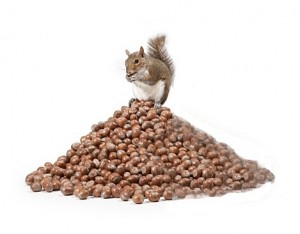 And oh my God, that is the biggest squirrel I have ever seen! Look at the size of that thing and look at that gigantic pile of nuts! Wow! They’re so shiny! Oh and Mr. Armstrong’s UCI international license application did in fact require him to be governed by UCI ADR, WADA, and other anti-doping regulations “provided such regulations comply with WADA code,” but that doesn’t count because USADA is acting in violation of UCI ADR and WADA code because it’s refusing to be a powerless puppet to a corrupt organization. But wow, back to that squirrel. Awww, that squirrel’s tail is so fluffy! Oh look, it’s munching on those nuts with its cute little squirrel teeth!
And oh my God, that is the biggest squirrel I have ever seen! Look at the size of that thing and look at that gigantic pile of nuts! Wow! They’re so shiny! Oh and Mr. Armstrong’s UCI international license application did in fact require him to be governed by UCI ADR, WADA, and other anti-doping regulations “provided such regulations comply with WADA code,” but that doesn’t count because USADA is acting in violation of UCI ADR and WADA code because it’s refusing to be a powerless puppet to a corrupt organization. But wow, back to that squirrel. Awww, that squirrel’s tail is so fluffy! Oh look, it’s munching on those nuts with its cute little squirrel teeth!
So what, huh, something about Mr. Armstrong consenting to be governed by USADA through his UCI license? I didn’t hear anything; I was too busy looking at the squirrel named Ted Stevens and pile of shiny nuts and fancy, fluffy words. Mr. Armstrong concedes that his UCI license application required him to be governed by USAC and USADA, which is no surprise because it’s very well-established that everyone who participates in UCI races consents to UCI’s governance and UCI’s rules make it expressly clear that athletes are also subject to their own country’s cycling governing body and anti-doping agency. The only valid argument Mr. Armstrong has out of all 28 pages of squirrels is that USADA doesn’t have jurisdiction because Floyd Landis didn’t notify USADA of the anti-doping allegations; he notified USAC and UCI, which gave jurisdiction to UCI according to the rules. Or does it?
Let’s take a look at the UCI Cycling Regulations’ part 14 on anti-doping, shall we?
Section 1: Anti-Doping Rules of the UCI > Chapter 1: Scope >
Anti-Doping Violations Where No Sample Collection Is Involved
10. The UCI has jurisdiction for and these Anti-Doping Rules shall apply to any anti-doping violation committed by a License-Holder where no Sample collection is involved and that is discovered:
- (i) by the UCI, by one of its constituents or member Federations, by one of their officials, officers, staff members, members, License-Holders, or any other body or individual that is subject to the regulations of the UCI or one of its member Federations; or
- (ii) by a body or individual that is not an Anti-Doping Organization.
Discovery means the finding of elements that turn out to be evidence for facts that apparently constitute an anti-doping rule violation, regardless of the Anti-Doping Organization who qualifies that evidence as such.
11. If an anti-doping violation where no Sample collection is involved is discovered by another Anti-Doping Organization, the anti-doping rules of that Anti-Doping Organization shall apply.
Default Jurisdiction of the UCI
17. Where a National Anti-Doping Organization having initiated and directed Sample collection or which has discovered an anti-doping rule violation where no Sample collection is involved does not have the authority to conduct results management under any applicable rule, then results management shall default to UCI and hearings will be conducted as stipulated in these Anti-Doping Rules.
General comment to Chapter 1:
1) Under the Code, National Federations have by themselves no jurisdiction in Doping Control. The involvement of National Federations in doping control at the international level is laid down in these Anti-Doping Rules. However, Anti-Doping Organizations having jurisdiction under the Code, may delegate jurisdiction to National Federations. National Federations and their respective National Anti-Doping Organization may agree on the Federation’s involvement in Doping Control at the national level.
The question becomes: did USADA delegate to USAC? And my answer is I have no idea and it doesn’t matter because Mr. Landis sent the emails to UCI too, which gave them jurisdiction to investigate the allegations. UCI ADR tends to support exactly what Mr. Armstrong is claiming – that because UCI was notified of the alleged anti-doping violations, UCI retains automatic and exclusive jurisdiction to conduct results management.
Should the United States of America lose jurisdiction to arbitrate an alleged anti-doping violation of an American athlete merely for want of a technicality? If we are going to argue fairness and due process, is it fair that USADA lose all jurisdiction to resolve a dispute regarding one of their athletes – an athlete who unambiguously consented to their jurisdiction – merely because the reporter of the alleged violation emailed the American and international governing bodies instead of the USADA?
WADA Article 15: Clarification of Doping Control Responsibilities
15.3: Results Management, Hearings and Sanctions
Except as provided in Article 15.3.1 below, results management and hearings shall be the responsibility of and shall be governed by the procedural rules of the Anti-Doping Organization that initiated and directed Sample collection (or, if no Sample collection is involved, the organization which discovered the violation). If that Anti-Doping Organization does not have the authority to conduct results management, then results management authority shall default to the applicable International Federation.
[Comment to Article 15.3: The Athlete’s or other Person’s International Federation has been made the authority of last resort for results management to avoid the possibility that no Anti-Doping Organization would have authority to conduct results management.]
Please note that this section is called “Clarification of Doping Control Responsibilities.” Comments are important because they offer further clarification for ambiguities.
Well shoot that’s a problem. UCI is the international federation for cycling and WADA just said that it should be the authority of last resort, not first resort, only in order to avoid a circumstance in which an athlete can escape liability altogether merely because of the absence of a national anti-doping agency. UCI’s rules fly in direct contradiction to this clarification comment by making UCI the default authority instead of authority of last resort. In fairness, WADA does say that international federations are permitted to make their own rules, however, those rules cannot be contradiction to WADA code and UCI’s rules appear to be rather contradictory.
But I’m not done yet. I’m going to apply some Lance Armstrong Legal Team logic. Even if UCI’s rules don’t contradict WADA code and UCI has exclusive jurisdiction, the UCI shouldn’t be allowed to conduct results management because they are operating in violation of their own rules and WADA code. Mr. Armstrong never consented to be governed by a wrongful application of their rules.
Let’s go back to the UCI Cycling Regulations section on Anti-Doping again.
Chapter 7: Results Management
Results Management Where No Adverse Analytical Finding Is Involved
229. The UCI shall examine concrete elements indicating that an anti-doping violation may have been committed, in particular any failure to comply with these Anti-Doping Rules and the Technical Documents.
230. The Rider or other party shall be informed of a possible failure to comply and has the opportunity to respond. A hearing is not required to be held.
231. The UCI may obtain information from all available sources. National Federations shall be obliged to conduct investigations as the UCI may deem appropriate and inform UCI of their results. All License-Holders are obliged to assist in such investigations and provide information requested.Conclusion Of Results Management Process
232. If upon conclusion of the results management process, the UCI considers that no anti-doping rule violation or any other breach of these Anti-Doping Rules has taken place, then the case shall be taken no further.
This decision shall not be definitive and the UCI may reopen the case on its own initiation.
And let’s revisit the World Anti-Doping Code again:
WADA Article 7: Results Management
7.4 Review of Other Anti-Doping Rule Violations Not Covered by Articles 7.1–7.3
The Anti-Doping Organization or other reviewing body established by such organization shall conduct any follow-up investigation into a possible anti-doping rule violation as may be required under applicable anti-doping policies and rules adopted pursuant to the Code or which the Anti-Doping Organization otherwise considers appropriate.
According to UCI ADR and WADA code, UCI was obligated to conduct an investigation into Mr. Landis’s accusation and UCI should’ve required USAC, since it was the national federation that was directly informed of the allegations, to conduct their own investigation as well. Does anyone remember any of that happening? Mr. Landis’s emails began on April 30, 2010. UCI summarily dismissed the allegations and never conducted a follow-up investigation as required by WADA. Instead, UCI decided to file a lawsuit against Mr. Landis for defamation. It wasn’t until over two years later that USADA initiated a formal investigation against Mr. Armstrong for claims that UCI failed to investigate.
So, tell me again, why should UCI be granted exclusive jurisdiction in this case?
* * * * *
Written by Anna Zimmerman exclusively for Cyclismas.com.
To read more from Anna Zimmerman, please visit:
http://www.150wattsofawesome.blogspot.com
© Anna Zimmerman 2012. All rights reserved.

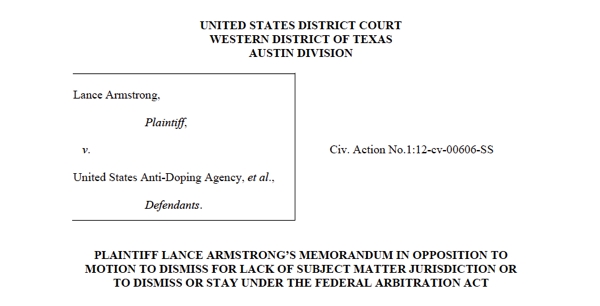
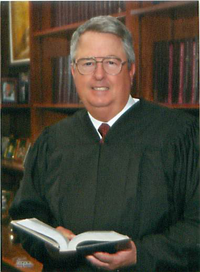

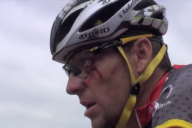






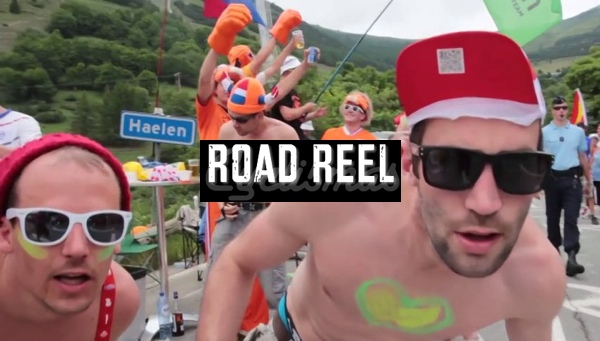
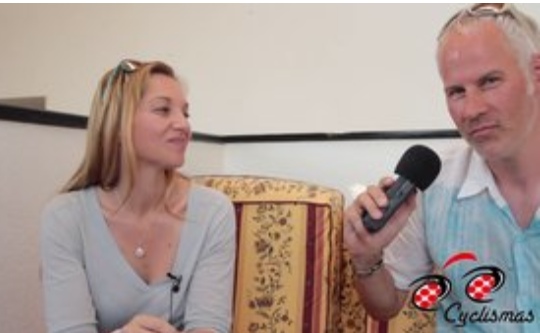
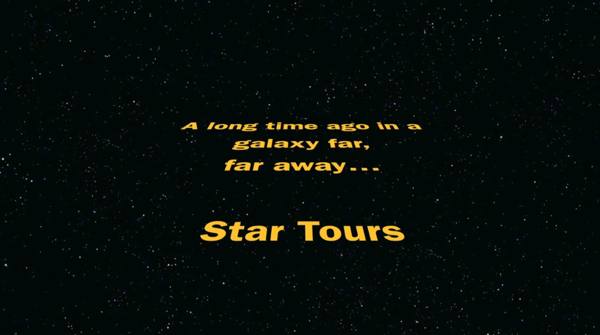


18 Comments
Good analysis.
Good analysis. Much better than other lawyer/athletes have managed.
You cut through the verbiage and muck of Armstrong’s arguments to what
is at stake. You are right that the case will turn on ‘jurisdiction’,
UCI or USADA. One important point you do not mention is that
Lance Armstrong has in the past repeatedly said that he was under USADA
jurisdiction for discovery and results findings, and even requested (and
received) a letter from USADA regarding this. Still the question of jurisdiction is where Armstrong wants to hang his hat.You
seem to assume throughout your analysis that the correspondence of
Floyd Landis is the sole initiator of the USADA investigation. UCI and
Armstrong also make the Floyd Landis communications appear to be the
initiator of the investigation. The USADA has made it repeatedly clear
that Floyd Landis only played a limited role in its investigations. If
USADA has other grounds for having initiating the investigation (and
perhaps USADA can even demonstrate that they had discovery prior to the
Landis communications), then the UCI claim of jurisdiction becomes much
more muteDo not be misled in jurisprudence by Bock’s response to
McQuaid: Mr. Bock was only addressing the limited (and parse) arguments
of Mr. McQuaid, who focused the question of jurisdiction on the Landis
communications. Both Armstrong’s (obviously incompetent) lawyers and UCI
(my bet relying on the same incompetent PR and lobby spinners masked as
JD’s) are desperate to get USADA to tip its hand on ‘evidence’. This
just ain’t gonna happen.Anna, great job. Just remember what I
told you: Be careful who you have coffee with. There are a lot of doped
up creeps out there with needle marks Tweeting.
LauraLyn I’m limiting my analysis to facts currently in evidence. At least as of the wee hours on Monday morning, only Lance Armstrong is claiming the UCI has jurisdiction on the basis of “discovering” the evidence through Floyd Landis’s email. The USADA has thus far been silent on the issue of claiming jurisdiction through “discovery.” I suspect we’ll hear the USADA’s response to the initial discovery in the imminent future.
LauraLyn I’m limiting my analysis to facts currently in evidence. At least as of the wee hours on Monday morning, only Lance Armstrong is claiming the UCI has jurisdiction on the basis of “discovering” the evidence through Floyd Landis’s email. The USADA has thus far been silent on the issue of claiming jurisdiction through “discovery.” I suspect we’ll hear the USADA’s response to the initial discovery in the imminent future.
ZimmermanAnna Be careful with those late nights working by candlelight between all the tweets.You seemed to have not only missed the evidence already present last Friday evening and already present in the original charges brought against the six accused conspirators, but also a fundamental argument in the USADA’s case from the beginning. The USADA was far from “silent no the issue of claiming jurisdiction through ‘discovery'”.The USADA’s lawyers were perceptive enough to realize that the question of jurisdiction is intimately intertwined with the question of discovery. In the evidence before the court, the USADA has extensively argued that1. UCI has no legitimate ground to claim discovery in this case.2. USADA explicitly claims discovery in this case, and that discovery is much more extensive than that proposed by Armstrong and UCI: As
USADA’s notice and charging letters of June 12 and June 28, 2012 make
clear, the information provided to USADA by Mr. Landis (which goes far
beyond the contents of the April 30, 2010 email) is just a small
fragment of the evidence of the numerous anti-doping rule violation that
were committed by the Respondents. [Many more references in the evidence to discovery by the USADA could be easily presented.]Again, a good start at the analysis. It is difficult to get past all the bla bla bla from Armstrong’s PR lawyers and McQuaid’s rambling pontiffs. Let’s hope Judge Sparks is more attentive to the evidence and the fundamental arguments being presented.
Well done for ploughing through all those extra pages. Try to think of each one as a blessing in disguise – Lance’s legal bills are steadily eating away at his ill-gotten gains. By the time he’s been stripped of his Tour titles and all his sponsors and partners and victims have finished suing him, perhaps he’ll be living under a bridge. Maybe that’s why he’s stashing money in a Ugandan gold mine? Perhaps your next assignment could be to find out how his plaintiffs can retrieve it?
I believe USADA has included in the allegations against Armstrong evidence of doping in blood samples collected by the UCI:”Lance Armstrong’s doping is further evidenced by the data from blood collections obtained by the UCI from Lance Armstrong in 2009 and 2010. This data is fully consistent with blood manipulation including EPO use and/or blood transfusions.” http://www.scribd.com/doc/97022278/USADA-v-Armstrong-et-al. (Quote found on page 11).It would seem that the UCI would maintain jurisdiction over these samples, and all that any testing of these samples may imply. If so, can The Armstrong Legal Team and/or UCI exclude the samples? Can USADA be limited to the witness testimony and any other evidence they obtained themselves?
BigJonny The UCI blood samples are indeed likely to play more of a supportive role in the USADA case than a leading role. On the one hand, the USADA could likely easily go forward without any UCI-collected biological samples for its case against the six conspirators. But this question will likely be mute. Both Lance Armstrong and UCI have a vested interest to prevent significant parts of the evidence from becoming public. The case in front of the Federal District Court will turn on the question of jurisdiction according to WADA, UCI, USA Cycling, and USADA rules. And this is a pickle for both sides.The case is actually clearer and more straight forward than presented in the above blog. It is better to have this describe by lawyers with an understanding of jurisprudence.
LauraLyn It seems both sides are scrapping to make certain things public as public image is at stake. That said, is this really a matter of first impression? No other athlete (Landis & Hamilton come to mind) make like challenges to jurisdiction? Is the crux of the matter really as simple as who picked up the phone when Landis dropped a dime? He put that on blast – everyone knew about it in short order. I’ve been following the allegations re: Armstrong for a long time. Nearly twenty years now. He’s not quite Teflon, but he’s damn close.
Pls forgive the typos, I’m a bit hurried.
BigJonny Typos are cool. They keep us human. :)You are right about the Teflon. Lance Armstrong is not only a great athlete, he is incredibly clever and a good businessman. He has made the name bigger than the performances, in both athletics and his own cancer survival. The public believes at face value what he says. He silences his enemies, even destroys their lives, and reminds his friends the consequences of un-friending Lance.The question before the Federal District Court has to do with jurisdiction, and it has been recently sharpened. The question of Lance’s own rights and due process is mute. There is no case law that would support those arguments. Indeed, there is abundant that demonstrates the USADA is on solid ground.Regarding jurisdiction the Landis e-mails to USA Cycling and UCI will only pay a partial role. The USADA can likely demonstrate discovery on other and stronger grounds as well.What has not yet come up in the case yet in an explicit way, but what we should expect is that the question of jurisdiction will likely be heavily influenced by the question of due process according to the rules I indicated above. We can expect that USADA will argue in its next brief that UCI itself is proposing to invent an entirely new procedure for this case alone – going directly to CAS before allowing the national procedures to play out first. There is no precedent for this.Keep in mind that Judge Sparks will need to take into consideration due process not just with regard to UCI, USADA, and Lance Armstrong, but also with regard to the sport and other members of associations.With regard to ‘both sides scrapping to make things public’, we have not see yet where the USADA has taken this to the public. They have only filed court papers, as required, and responded privately to correspondences. Lance Armstrong, on the other hand, has leaked documents in advance of them going to court, he has hired and used PR and Lobby suits in Washington, DC that have been exceptionally active in the public and political domains. UCI has issued statements and Pat McQuaid has given several (contradictory) interviews to the media. The Lance Armstrong Foundation (LiveStrong) has been using cancer dollars to lobby for its hero. USADA has not engaged these questionable practices.
Today
the World Anti-Doping Agency (WADA) instructed UCI to support United States
anti-doping officials and provide the USADA requested files and documents UCI
has to support the investigation into Lance Armstrong.
WADA
wrote to Pat McQuaid on Tuesday stating that he must withdraw his request to
take jurisdiction of the Armstrong case fromUSADA.
WADA
reminded UCI that the USADA “which discovered the violation must have results
management authority” in a case.This supports USADA’s claim to discover and jurisdiction.
LauraLyn Tick, tick, tick…
BigJonny The USADA is good. Smart folks.But yeah, it remains to be seen if the Teflon effect has worn off.Great talking to someone who understands this case.
LauraLyn I think it is beginning to wear. At least around the edges. I brought up the Court of Public opinion earlier today, mostly thinking of Armstrong. But I said both parties at the time. I was trying to be generous with my commentary. If USADA maintains jurisdiction over the matter (and I cannot imagine that they would not), and former US Postal team mates testify (or have testified) as, really, the entire world thinks they will, there is no way good way forward for Armstrong. He has painted himself into a corner with his steadfast denials of all things doping. The Armstrong brand will be damaged beyond repair. Perhaps it already has been.
BigJonny See the article in today’s Velonaton http://www.velonation.com/News/ID/12588/ArmstrongUS-Postal-case-UCIs-jurisdiction-claims-further-undermined-by-Landis-timing.aspxand for a good discussion see the one The Examiner http://www.examiner.com/article/latest-struggle-by-cycling-organizations-could-threaten-sport-s-olympic-status This is really good and a part that most people didn’t see. By arguing this case the way he is, Armstrong is essentially trying to create a set of rules just for him. Should he succeed he would make the lives of 99.9% of other athletes horrible for settling disputes. He would also destroy the American reputation in honesty in sports and eliminate the US from the possibility in participating in future Olympics. It is amazing the depth of this man’s selfish egoism.Jurisprudence is not something people should play at, particularly without qualification or understanding.
Regarding jurisdiction and discovery: The Luxembourg Anti-Doping Agency (ALAD) announced the following today regarding an athlete, Frank Schleck, who rides for (and is currently in good standing with) the RadioShack Nissan Trek team. Yes, this is the same team co-owned by Lance Armstrong and managed by Johan Bruyneel.”Since the testing and the finding of the alleged violation have been made by the UCI as a competent body, the ALAD upon presentation of the test results can only make the final statement of of an alleged violation of a doping rule,”So how can UCI and Lance possibly make serious their claims to a Federal Court last week? Only Lance gets to play by a whole new set of rules (still needing to be written)?
In yesterday’s court case the judge asked just the questions one would have expected regarding jurisdiction and due process. Happy to see things progressing as they are.